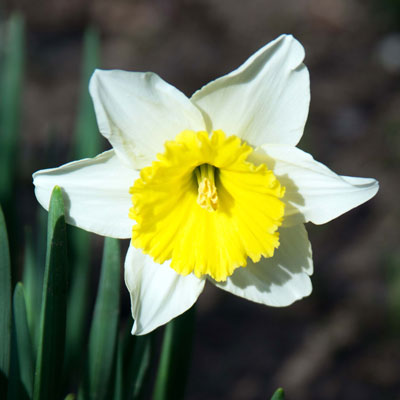My Top 2 Daffodils
If you’re looking for daffodils that will establish and rebloom year after year, you need these two. They’re certainly among the best-selling, best-performing varieties world-wide, and they have a lot of years under their belts to prove it.
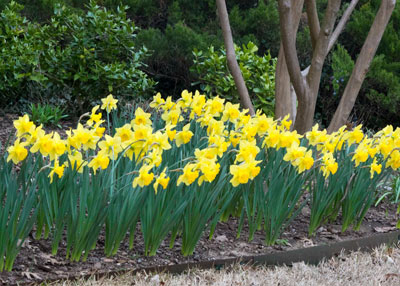
Carlton…
Let me just give you the short-form details.
Color: Sulfur yellow
Hybridizer: Percival D. Williams (England)
Year registered: Prior to 1927
Classification: 2 Y-Y (Large-cupped)
Height: 16-18 inches in my garden
Naturalizes well in Texas? Yes!
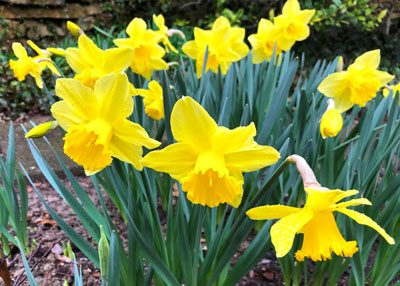

(I had certainly seen Carlton lots of places, but I didn’t realize how very good it was until I read that it and Ice Follies were two of the best-selling daffodils in the world. And it was my friends Brent and Becky Heath of the online source Brent’s and Becky’s Bulbs in Virginia who were saying that. That carried huge weight in my eyes! And – they said those two were among the best “naturalizers” for the South! Bingo!)
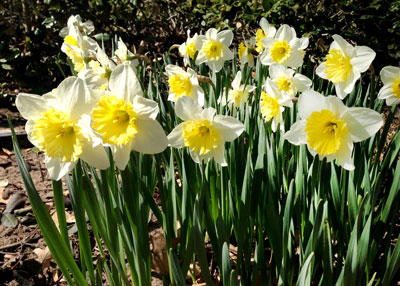
Ice Follies…
And again, the pertinent facts.
Color: Opens greenish-yellow, matures to white.
Hybridizer: Konynenburg and Mark, the Netherlands
Year registered: Prior to 1953
Classification: 2 W-W (Large-cupped)
Height: 16-18 inches in my gardens
Naturalizes well in Texas? Yes!
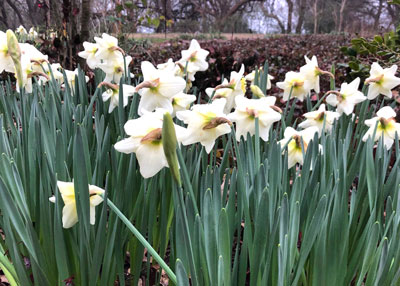
(My friend Bob Brackman introduced me to Ice Follies 30 or more years ago while he was at the Dallas Arboretum. He showed me plantings that had been made by the property owners even prior to establishment of the Arboretum in the mid-1970s. That’s when I planted it, and I’ve had mine ever since.)
Planting your bulbs…
Fall is the season to plant daffodils. Supplies will begin showing up in better gardening centers in late September and October. Online sources begin taking orders as early as March for fall delivery.
Daffodils do not require pre-chilling (refrigeration) like tulips and hyacinths will.
Both of these daffodil varieties will give the best annual show if you plant them in masses of 15 or 25 bulbs (or many more) in a drift where they can remain undisturbed for many years.
It’s best to plant them in a dedicated perennial garden and not into open turf. You must allow their tops time to die down naturally so they can store food for the next year’s flowers, and by the time they would do that the grass would be growing far too tall.
Your perennial bed will probably have highly organic soil that will be perfect for daffodils. Slightly raised beds are ideal to ensure perfect drainage. Set the bulbs twice as deep as they are tall, and plant them 3-4 inches apart for the best massed effect.
FAQ: How come my King Alfred and other big daffodils only bloomed their first year? Now all I get is leaves.
That’s typical of King Alfred, Unsurpassable, Mount Hood and many of the other large, late-flowering hybrid daffodil varieties. While they may be great for one-time use in patio pots or in an entryway garden, they do not “naturalize” and come back to rebloom in successive years. As mentioned, all you normally will see after that first year will be masses of leaves that look like a groundcover of liriope. Most gardeners leave that experience very disappointed.
Finally, it must be noted that there are hundreds of other fine varieties of narcissus, jonquils and daffodils in the marketplace. Enthusiasts in the American Daffodil Society will be holding their national convention in Dallas, March 12-15. They’ll be looking at the newest and most exciting cultivars just being introduced.
Who knows? Some garden writer in a hundred years may be writing about them like I’ve just written about Carlton and Ice Follies.
